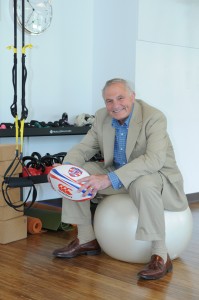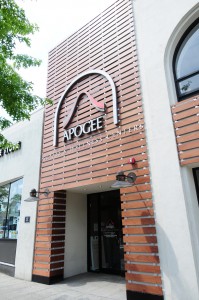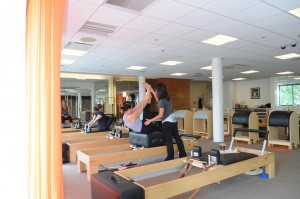 One might say that success is derived from hard work and a little luck. Although, Jon Prusmack, the founder of Apogee Pilates & Wellness in White Plains, N.Y., would suggest that success is the result of necessity.
One might say that success is derived from hard work and a little luck. Although, Jon Prusmack, the founder of Apogee Pilates & Wellness in White Plains, N.Y., would suggest that success is the result of necessity.
Prusmack didn’t become an entrepreneur in the fitness industry from the beginning. Actually, owning fitness clubs has been a new venture for Prusmack. However, at 69 years old, it’s an endeavor that has been in line with his lifelong passions.
A Gentleman’s Game for Hooligans
Prusmack was a competitor from a very young age. As a halfback on the American football field, he took his talents in 1960 to Notre Dame University. Following two years of playing — he dressed varsity his second year — he transferred to the Naval Academy, and, although he had to sit out a year for the transfer, he eventually dressed varsity and lined up behind hall-of-fame quarterback Roger Staubach.
But, Prusmack wasn’t finished.
He felt that being a U.S. Naval officer wasn’t in his cards. He transferred a second time to New York University. “So, in 1965, I resigned and transferred to NYU,” he said in his thick New York accent. “They were Division III, so to play was not an issue. The team was terrible, but in the land of the blind, the one-eyed man is king. I was the MVP in 1965, but this doesn’t say much.”
For Prusmack and NYU, 1965 was the final year of American football — NYU never rekindled its American football program. In 1966, he took the field as a rugby player and never looked back.
Rugby was the catalyst for Prusmack’s “world view.” He was introduced to players from all over the world that had a common love of rugby. Being introduced to those players helped the young Prusmack to get viewpoints on business and a small sense of international commerce. However, Prusmack wasn’t a business major — he was a business minor, art major. “An artist looks at the world differently than strictly a business guy,” he explained. “An artist looks at the world as what’s possible, versus a lot of other people saying that’s impossible.”
Following graduation, Prusmack found himself in a pickle searching for a job. He continued to play rugby and found himself traveling to Spain for a short time. In Spain he spent time focusing on his art and honing his creative abilities.
He was desperate for a job and was running out of options. With a return to the U.S., he decided to open a small art and design company. The company satisfied Prusmack’s desire to be an artist, but he still needed a little more income. Finding ways to make more money was out of necessity, not a desire for immense success.
The Ultimate State of Wellness
Apogee Wellness was developed just like many other business ventures Prusmack has tackled in his life. He was presented with an idea — a Pilates magazine — he mulled it over, saw opportunity for something bigger and developed Apogee.
The name of Apogee Wellness was derived from a conversation with a doctor. “It’s very simple. I said, ‘what is wellness,’ and a doctor said to me, ‘wellness is the ultimate state of good health.’ If you look at a parabola, the highest state (apogee) is the ultimate state, so it made sense, ‘Apogee,’ the ultimate state on the parabola, and wellness is the highest state of good health. So, that’s how I connected the two.”
In 2008, at the time Apogee was just being developed, Prusmack had never been involved in the fitness industry. “I’m not a fitness expert,” he stated. And, he admits that in the beginning he made a lot of mistakes. But, he had an idea that was progressing in the right direction. Pilates had originally garnered his attention concerning Apogee, but the idea of wellness was the all-encompassing factor.
For Prusmack, wellness meant more than just Pilates and yoga. Wellness was essentially everything that comprised good health. Apogee has positioned itself to work one-on-one with hospitals and medical clinics, as well as incorporating nutrition, massage, education and fitness testing programs into the Apogee facilities. However, in the beginning, the programs didn’t come easy.
“Inside this industry, there is a lot more room for self-promotion and exaggeration,” Prusmack said. “If you take certain people at face value, you’re going to get hurt. I took a lot of people at face value and got hurt.”
Prusmack believes that you must have the right people around you to succeed. In the beginning, he struggled to find the right people to surround him at Apogee. However, those times have changed and Prusmack said his team is solid.
Discovering the best market and how to reach a certain type of member has been the second great challenge. “I think what I’m going to focus on more than anything is a market of people who want to stay healthy and try and integrate nutritional counseling, stress management and exercise as a way to continue your good health.”

Apogee Wellness is on the verge of developing a measurement for the three E’s. “What we are in the process of doing is the Apogee score,” he said. “We are getting close to getting this as a measurement, so that when people come in to sign up for a membership they would take a test. Part of the test would be through a pinprick which would look at your red blood cells, your cholesterol, your hemoglobin, and you look at your body mass index and you have 12 criteria that would determine what your body condition is. Also, the member would fill out a questionnaire.”
Members, old and new, could go through this test where they would be given a score at the end. “That would tell them what their Apogee score is,” Prusmack explained. “In the processing, we’d tell what’s the good zone, what’s the normal zone and what’s the bad zone. We’ve got a couple of doctors we’ve employed to help us as well.”
Prusmack believes that the Apogee score will be something they can promote to attract new members. He also believes in a grass-roots approach to marketing. “We are going to go back to grass-roots, which means, in some parks we are going to have Yoga and Pilates demonstrations,” he said. “Let people participate in a class, and give people free passes for them to come.”
Free passes are a major piece to the sales puzzle for Apogee, according to Prusmack. He believes that if people can get inside the clubs and see for themselves, they will become members. “The more people we can get in with free passes, the greater our chances are for increasing our membership,” he said.
Finding alternate routes for attracting attention to his products is something Prusmack has continually dealt with in business. In the early 1980s, he began selling medical supplies to the Middle East. Although, the opportunity promised great rewards, it wasn’t a quick start up.
Prusmack searched for months before he found a single buyer. However, once he found his buyer, things were off and running. Selling medical supplies eventually took Prusmack to the Middle East to meet his buyers — out of the necessity of good business. That single trip changed his life forever.
Tents Lead to Wellness?
During his trip to the Middle East, Prusmack bumped into a couple of British gentlemen that shared Prusmack’s love of rugby. They bonded over the game, but what benefitted Prusmack was their knowledge on conducting business in the Middle East.

Prusmack’s lack of knowledge of field hospitals pushed him to do research — again, out of necessity. “I got back to the states and I figured I’d call the Pentagon up because they, the army, knew about field hospitals. I found a guy called Bud Balderson who was the head of the deployable medical systems for the army.”
Balderson showed Prusmack all of the army’s field hospitals. “The new thing was C.A.S.H., Combat Army Surgical Hospital, which took over from M.A.S.H.,” Prusmack said. “[Balderson] said, ‘Well, this is all very nice, but none of it works because the army’s not going to provide engineering support to the doctors and nurses, and they’ve got to learn how to put up the tents by themselves. These are very heavy laborious, so once someone puts them up, no one is going to take them down — they’ll leave them there. If you can come up with a tent system that can be really light weight, a couple of people could put up and take down, you’ve got a winner.’ I said that was impossible.”
Prusmack had asked his wife Patti to keep her eyes open for ideas — years passed, but it was Patti who found the solution. “She was an exhibit designer, and she came back and showed me this pop-up display system that they used for exhibits,” he said. “I took a look at that and I redesigned it, and reengineered it to make it be a shelter. Then I built two. That time frame was a good number of years because I was doing it on my own.”
Through development, D.R.A.S.H. (Deployable Rapid Assembly Shelter) was born. D.R.A.S.H. was the perfect idea for military use. However, the defense budget wasn’t ready to spend on such an idea. That’s when Prusmack realized the military had multiple budgets, one that purchases ships, planes, tanks and the sort, and one that is distributed to ground forces to purchase necessary items. Prusmack marketed his product directly to the ground troop companies.
“I thought the product was really terrific,” he said. “I hired a company in Washington that was in the defense business. So, in 1988-‘89 I set up a small production facility and learned how to make it and we started to sell this unit-by-unit. Over time, almost 10 years later, we hit over a million dollars in sales.”
D.R.A.S.H. gave Prusmack the ability to venture into other areas where his passions led. He purchased Rugby Magazine, America’s only in-depth rugby publication. He also owns America’s premier rugby event, the USA Sevens International Rugby Tournament. Prusmack used the USA Sevens to develop a deal with NBC, which has allowed collegiate rugby to gain national recognition during its tournament in the late spring.
Finally, through the success of D.R.A.S.H., Prusmack followed his life-long healthy mindset into Apogee Wellness. “I decided that because of the fragmented nature of Pilates and yoga, we would set up a beta site, build a brick and mortar facility that would be beautiful and incorporate the latest equipment and instructors, and kind of make it what it should be. Either use that as a model for franchising or expanding.”
Over the next 10 years, Prusmack sees Apogee growing into a worldwide wellness brand. He hopes to have 50 locations in all major cities around the world. Apogee Media is the next byproduct of Apogee Wellness. “Basically a technology company to provide videos on training to health clubs and trainers,” Prusmack said. “We built a studio to do all the videos. We are going brand everything so that we have Apogee Education, Apogee Wellness, Apogee Media and Apogee Retail.”

Although, it’s not always easy, Prusmack believes “great love and great achievement, involve great risk.” Through world travel and successful business, he said he tries to not let things bother him — “most of the things you can’t control.” -CS
By Tyler Montgomery





